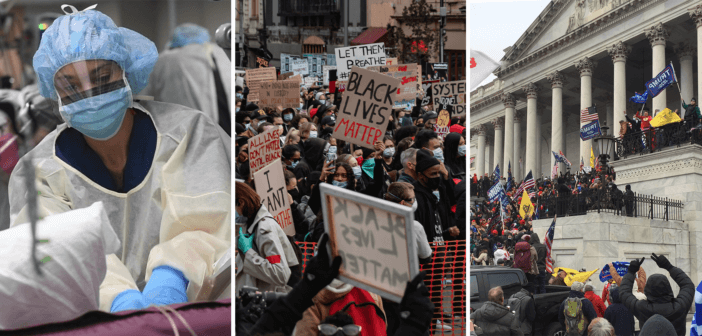David Brubaker says congregational leaders are in the precarious position of responding to three simultaneous crises — the pandemic, racial reckoning, and political violence. This unprecedented situation requires that leaders stay connected with their people, lead from deeply held values, and name and grieve losses.
What can a congregation do when a pandemic, a political crisis, and a racial reckoning come knocking at the same time? We were already overwhelmed by a 10-month-long pandemic and growing polarization. Then last summer’s nationwide protests against racialized state violence forced many white citizens to begin to come to terms with our country’s 400-year legacy of racial injustice. On January 6, a violent mob stormed the U.S. Capitol, threatening revenge against those they believed had betrayed them. Three major crises at once pose unprecedented challenges for congregational leaders.
Three congregations, three crises
In the past year I’ve consulted with three congregations that were impacted by each of these three crises. Following are their stories, with details altered to disguise the identity of each congregation.
Like many congregations, First Community Church pivoted last March to “online only” worship services and meetings due to the pandemic. By the fall, many members were expressing a strong desire to “return to normal.” Leaders decided to offer three options: online only, in-person worship, and “parking lot” services. But offering three modes of participation was exhausting for church staff and volunteers. After six months, with the COVID-19 caseloads rising, leaders were ready to throw in the towel and revert to online only.
Located in the heart of the Old South, leaders of Placid Valley Fellowship decided two years ago that it was time to confront its racist legacy. The lead minister planned a series of sermons on the imperative of “racial justice and racial reconciliation,” and members of the multiracial staff were supportive. But by the second week of the series, not all was placid in the valley. Two long-term families threatened to leave the congregation if the sermon series continued, and a third leading family member resigned from the congregation’s board with a promise to “never again support this congregation as long as leaders insist on fomenting division.”
St. Lydia’s, a large mainline congregation, has long prided itself on being “the purple church.” Leaders boast that St. Lydia’s congregation reflects the country and its state, with an equal mix of Democrats and Republicans. But when the lead minister condemned the assault on the nation’s capitol building on January 6, she discovered that the congregation wasn’t so purple after all. “They were patriots, not rioters,” she was told, “and they should be praised, not condemned!” After receiving multiple angry emails and accusations of being a “socialist,” she pondered whether it was time to submit her resignation.
Each of these vignettes reflects the precarious position of congregational leaders encircled by a global pandemic, a national reckoning with racial injustice, and renewed threats of political violence. No longer focused only on life transitions (“birthing, marrying, and burying”), congregational leaders now are burdened with society’s most wrenching challenges. What are they to do? I suggest three primary responses:
1. Stay connected with your people.
The members of your congregation are your most important constituents. Their needs, anxieties, hopes, and dreams are what matter most right now. Ask your people what they need and what they hope to see in the coming days. They will keep you grounded as you help them back to core beliefs and principles.
2. Share your own deepest values and vision.
Every crisis tries the character of leaders. In the multiple crises that we face now, leaders must decide whether they will lead from their own core or be driven by the wind. This is a time to share your own “I have a dream” vision — not merely to condemn the anti-democratic or violent behavior of others, but to create a vision of the future that you desire for your congregation and community.
3. Grieve the losses.
“I don’t know the secret to success,” a wise person once said, “but the secret to failure is trying to keep everybody happy.” It will not be possible to get through the multiple crises now facing American society without some losses. More than 500,000 citizens have already died from the pandemic, millions have suffered from racial injustice, and hundreds have participated in political violence. It is impossible to keep conspiracy theorists, white supremacists, and insurrectionists happy while also speaking from your own deepest convictions and the truths of your tradition. There will be losses, and they need to be named and grieved.
There has never been a time in our history when American society faced three such major threats simultaneously. The country experienced a global pandemic — the Spanish Flu — in 1918. It has endured wars that killed hundreds of thousands — the Civil War and World War II. But the combination of a global pandemic, a racial reckoning, and an internal insurrection is unique in our history. Congregational members are understandably anxious if not distraught. As leaders respond to their real needs, we must do so based on our deepest values and the wisdom of our own tradition.
But I pray to you, Lord, in the time of your favor; in your great love, O God, answer me with your sure salvation. Rescue me from the mire, do not let me sink; deliver me from those who hate me, from the deep waters. Do not let the floodwaters engulf me or the depths swallow me up or the pit close its mouth over me. Answer me, Lord, out of the goodness of your love; in your great mercy turn to me. Do not hide your face from your servant; answer me quickly, for I am in trouble. Come near and rescue me; deliver me because of my foes. — Psalm 69:13–18
This article originally appeared in Perspectives for Church and Synagogue Leaders, the e-newsletter of the Congregation Consulting Group.
Related Resources
- Leading During Turbulent Times by Doug Powe, Ann A. Michel, and Lovett H. Weems, Jr.
- What Does Strong Leadership Look Like? by John R. Matthews, Kristina R. Guitierrez, and Ross D. Peterson
- Leading in an Age of Political Polarization by David R. Brubaker







